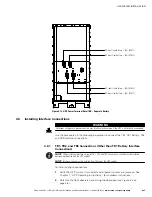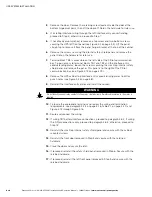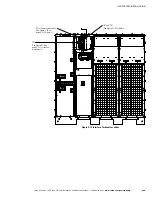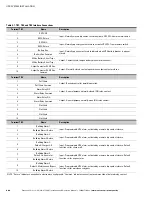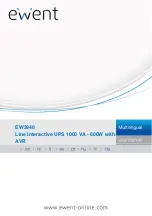
UPS SYSTEM INSTALLATION
Eaton 9395 Plus 1 UPS (225–275 kVA) Installation and Operation Manual
S
164201710 Rev 2
www.eaton.com\powerquality
4-5
4.3
Battery System Installation
If installing an Eaton battery cabinet, refer to the
Eaton 9395 Integrated Battery
Cabinet (Model IBC-L) Installation Manual
, listed in paragraph 1.8 on page 1-9.
If installing a customer-supplied battery system, install the battery system according
to the battery and battery system manufacturer's instructions and all applicable codes
and regulations, including the NEC, Article 480.
After the battery system is installed, proceed to paragraph 4.4 if installing a distributed
bypass tie cabinet; otherwise, proceed to paragraph 4.5 to complete the wiring of the
UPS.
4.4
Distributed Bypass Tie Cabinet Installation
NOTE
The tie cabinet must contain Module Output Breakers (MOBs) with dual auxiliary contacts for control
of the system. Without dual auxiliary MOBs, UPMs are not allowed to go to bypass individually during
servicing. All UPMs will go to bypass instead of the just the UPM needing service, decreasing critical load
protection. With dual auxiliary MOBs, one UPM can be bypassed while the remaining UPMs support the load
as long as the remaining UPMs have the capacity to do so.
If installing a distributed bypass system, install the customer-supplied tie cabinet or
distribution panel according to the tie cabinet or distribution panel manufacturer's
instructions and all applicable codes and regulations, including the NEC, Article 480.
After the tie cabinet is installed, proceed to paragraph 4.5 to complete the wiring of
the UPS.
4.5
Installing UPS External and Battery Power Wiring
NOTE
The UPS cabinet is shipped with debris shields covering the ventilation grills on top of the unit.
Do not remove the debris shields until installation is complete. However, remove the shields before operating
the UPS. Once the debris shields are removed, do not place objects on the ventilation grills.
NOTE
Remove the UPS cabinet top or bottom conduit landing plate to drill or punch conduit holes (see
Figure 4‐4 on page 4-8).
NOTE
If the load requires a neutral, a bypass source neutral must be provided. If the load does not require
a neutral and there is no neutral conductor connected at the bypass input, a neutral to ground bonding jumper
must be installed. DO NOT install both a source neutral and a bonding jumper. See Table 3‐4 on page 3-8 for
neutral bonding jumper wire sizes. Bonding jumper must be copper wire.
C
A
U
T
I
O
N
HIGH IMPEDANCE GROUND SOURCES - If the supply source is a high impedance ground (IT) type, the input
neutral conductor must be connected from the source of supply. If there is no output neutral connected to
the UPS, the neutral‐forming transformer kit may be used instead of pulling a neutral from the source. If the
load requires a neutral, then an input neutral conductor must be pulled into the UPS. In no circumstances
shall a neutral to ground bonding jumper be installed in the UPS.
C
A
U
T
I
O
N
DELTA SOURCES (TN‐S) - The 9390 UPS system can be operated only from a delta supply source that is fully
floating and if the neutral‐forming transformer kit is installed in the UPS. The UPS cannot be operated from a
mid‐point or end‐point grounded delta supply source. With this type of supply source, there is no capability
to provide an output neutral. In no circumstances shall a neutral to ground bonding jumper be installed in the
UPS.



























